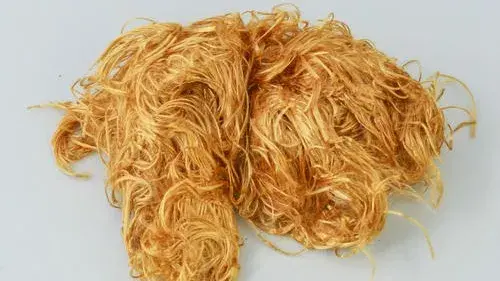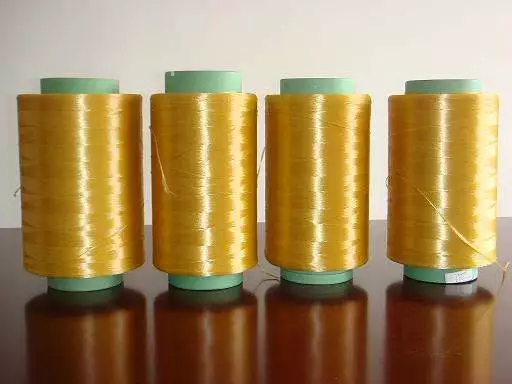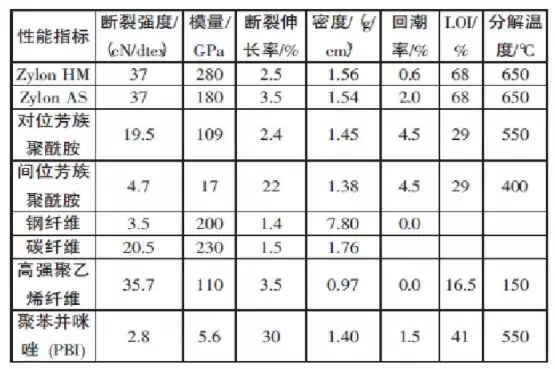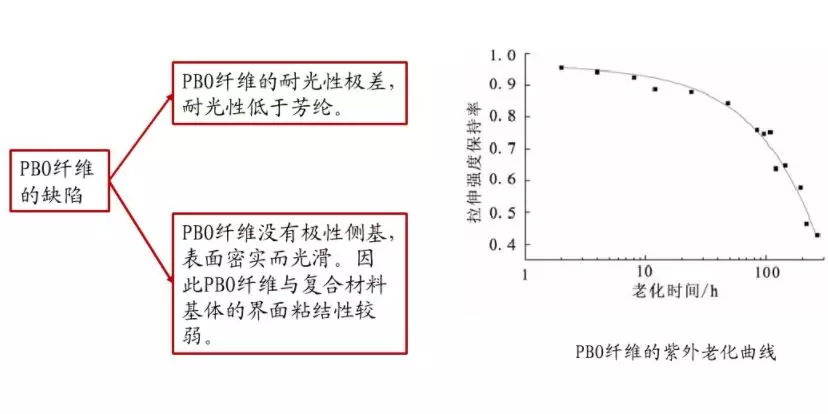Have you ever understood? In fact, polyparaphenylenebenzobisoxazole (PBO) fiber has the highest mechanical properties and heat resistance among organic high-performance fibers! Its strength, modulus, heat resistance, flame resistance, impact resistance, friction resistance and dimensional stability are all excellent, and it is light and soft, making it an extremely ideal textile raw material.

A PBO filament with a diameter of 1 mm can lift a weight of 450 kg, with a limiting oxygen index (LOI) of 68% and a density of 1.54-1.56g/cm3, it is a high-strength non-combustible fiber. The industrial production of PBO began in 1998 at the end of the last century.It attracted great attention as soon as it appeared due to its excellent performance, and it was called the “21st century super fiber”.

01
The development history of PBO fiber
PBO was originally developed by the U.S. Air Force Materials Laboratory in the 1970s as a high-temperature resistant material. However, it has been limited by the synthesis process and cannot be synthesized. The superior properties of PBO polymers with large molecular weights are also difficult to reflect. It was not until the mid-1980s that DOW Chemical Company developed a new monomer synthesis, polymerization and spinning technology. In 1991, it began joint research and development of PBO fiber with Toyobo Company. In 1995, Toyobo Company Trial production began under the patent license of DOW Chemical Company, and commercial production began in October 1998, with the registered trademark Zylon.
Up to now, Japan’s Toyobo is still the world’s largest company in the commercial production of PBO fiber. However, in recent years, my country has continued to increase the industrialization research of PBO fiber. On March 22, 2019, Chengdu Xinchen New Material Technology Co., Ltd. launched a 380-ton high-performance polyparaphenylene benzobisoxazole fiber (PBO) device per year. The smooth start of production marks a breakthrough in my country’s PBO fiber industry. Our country has thus become the second country in the world that can mass-produce high-performance PBO fibers after Japan’s Toyobo Company.
Figure 1 The development process of my country’s polyparaphenylenebenzobisoxazole fiber (PBO) industry

02
Performance Features
PBO The strength and modulus of the fiber are 1.0 times that of Kevlar fiber.
More than 8 times, the thermal decomposition temperature is as high as 650℃. , the heat resistance is 100°C higher than that of para-aramid, the limiting oxygen index (LOI) reaches 68, and it is a non-combustible fiber. Its density is 1.54-1.56g/cm3, which is lighter than carbon fiber (carbon fiber density 1.80-1.87g/cm3). The strength is 5.8GPa (reported in Germany is 5.2GPa), and the modulus is 180GPa, the highest among existing chemical fibers; it has excellent chemical resistance and is only soluble in a few acids such as concentrated sulfuric acid and polyphosphoric acid.

Japanese Toyobo Company divides its PBO fiber into two types, the textile fiber is called AS; and the fiber that has been heat treated to increase the elastic modulus is called for HM.
Performance comparison between PRO fiber and other fibers

Defects of PBO fiber

PBO fiber has poor compression resistance and surface drying performance. modification method to improve.
03
Preparation method
Preparation of PBO fiber It generally includes three steps: monomer synthesis, polymer synthesis and fiber spinning. There are currently many production methods for PBO fibers at home and abroad. Among them, the preferred method mentioned in the literature is to perform solution heating polymerization of 4,6-diaminoresorcin and terephthalic acid in a polyphosphoric acid solvent and a condensing agent. The polymerization liquid is in a liquid crystal state, and after deaeration and filtration, it can be directly subjected to dry spray spinning to produce as-spun yarn. The process flow of PBO fiber manufacturing is shown in the figure:
1.Monomersynthesis:PBOpolymersynthesisinprogress,4,6-diaminoresorcin(DAR)hydrochlorideisanecessaryintermediate.ThequalityofDARmonomersaltisoneofthemainfactorsaffectingtheperformanceofthefinalfiberproduct.Atpresent,themainsynthesisroutesandmethodsincludetrichlorobenzenemethod,resorcinolmethod,anilinemethod,resorcinolsulfonationchlorinationmethod,resorcinolsulfonationmethod,l,3-dichlorobenzenemethod,etc.
TheAmericanDowChemicalCompanysuccessfullydevelopedDRAmonomerusingtrichlorobenzeneasthestartingmaterial.�Reinforcementmaterials,fiberclothimpregnatedwithepoxyresinandpastedontheconcretesurface,cangreatlyimprovetheload-bearingcapacityandearthquakeresistanceoftheoriginalstructure.Inaddition,intermsofbridgeconstruction,steelwirecablescannotbeusedforlongbridgesduetotheirownweight.Instead,itishopedtousecableswithlightweightandhighstrength.CablesmadeofPBOfiberwithhighstrengthandgooddimensionalstabilityarethebest.sChoice.
PBO fiber is gradually replacing traditional material asbestos in the field of heat-resistant materials, and is currently exploring the use of PBO fiber in applications below 350°C. Flame-retardant fibers such as aramid. Applications above 350°C can replace inorganic fibers such as stainless steel fibers or ceramic fibers. Since inorganic fibers are hard, the products are prone to scars, which affects their performance. PBO fibers are entirely possible to overcome the shortcomings of inorganic fibers. In the past, organic fibers had insufficient heat resistance (mostly below 400°C), which limited the application and development of organic fibers. The decomposition temperature of PBO fiber reaches 650°C, which is the highest heat-resistant temperature among all organic fibers. Therefore, it is completely possible to use PBO fiber to replace the application fields above 350°C where it was difficult to use organic fiber in the past, and the application of PBO fiber heat-resistant materials can be broadened and developed.
Foreign studies show that there are many PBO fibers in other fields such as electrical insulation materials, satellite detection, lightweight materials, automobile industry and deep-sea oil field development. of use. As a high-speed train car body, PBO fiber can not only reduce the weight of the car body, but also increase the strength of the car body; using the chemical corrosion resistance of PBO fiber, it can be made into various corrosion-resistant protective clothing; in aerospace, in order to reduce the limited burden, PBO fiber is suitable It is suitable for making buttons, straps, etc. used in space; in space environments ranging from -10°C to surface temperatures of 460°C, it can also be used as a material for heat-resistant detection balloons; in sports and competitive rowing sails It is mainly made of sheet-like thin plate materials made of high-strength and high-modulus fibers. In order to minimize the deformation of the canvas when it is blown by the wind, it is necessary to seek PBO fiber with the highest modulus to make rowing sails; in view of PBO fiber With excellent mechanical properties, it is also the best material for manufacturing golf clubs, tennis rackets, ski poles, snowboards, surfboards, archery bow strings, and bicycle racing cars.
PBO fiber key technology research and development and industrialization development can help my country’s PBO fiber get rid of the long-term dilemma of being subject to foreign technology monopoly and control, and embark on a path of independent innovation and The road to localization and large-scale development of PBO fiber with bright prospects and broad applications will help the development, application and sustainable development of high-performance PBO materials in my country’s aerospace, national defense and civil industries.







